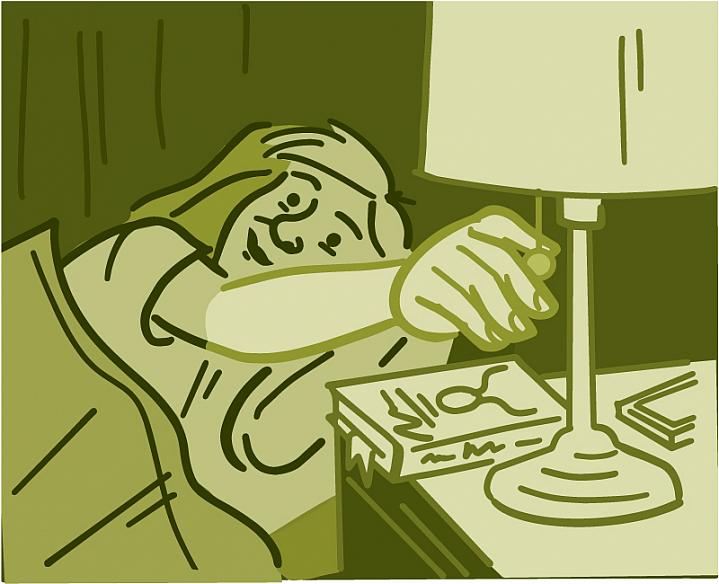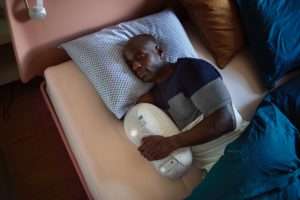Sleep1 is a complex biological process. While you are sleeping, you are unconscious, but your brain and body functions are still active. They are doing a number of important jobs that help you stay healthy and function at your best. So when you don’t get enough quality sleep, it does more than just make you feel tired. It can affect your physical and mental health, thinking, and daily functioning. This post ”Good Sleep for Good Health- 10 Keys” seeks to provide current and relevant information from a trusted source.
What are sleep disorders?
Sleep disorders are conditions that disturb your normal sleep patterns. There are more than 80 different sleep disorders. Some major types include
- Insomnia – being unable to fall asleep and stay asleep. This is the most common sleep disorder.
- Sleep apnea – a breathing disorder in which you stop breathing for 10 seconds or more during sleep
- Restless leg syndrome (RLS) – a tingling or prickly sensation in your legs, along with a powerful urge to move them
- Hypersomnia – being unable to stay awake during the day. This includes narcolepsy, which causes extreme daytime sleepiness.
- Circadian rhythm disorders – problems with the sleep-wake cycle. They make you unable to sleep and wake at the right times.
- Parasomnia – acting in unusual ways while falling asleep, sleeping, or waking from sleep, such as walking, talking, or eating
Some people who feel tired during the day have a true sleep disorder. But for others, the real problem is not allowing enough time for sleep. It’s important to get enough sleep every night. The amount of sleep you need depends on several factors, including your age, lifestyle, health, and whether you have been getting enough sleep recently. Most adults need about 7-8 hours each night.
Get the Rest You Need2

Sometimes, the pace of modern life barely gives you time to stop and rest. It can make getting a good night’s sleep on a regular basis seem like a dream.
But sleep is as important for good health as diet and exercise. Good sleep improves your brain performance, mood, and health.
Not getting enough quality sleep regularly raises the risk of many diseases and disorders. These range from heart disease and stroke to obesity and dementia.
There’s more to good sleep than just the hours spent in bed, says Dr. Marishka Brown, a sleep expert at NIH. “Healthy sleep encompasses three major things,” she explains. “One is how much sleep you get. Another is sleep quality—that you get uninterrupted and refreshing sleep. The last is a consistent sleep schedule.”
People who work the night shift or irregular schedules may find getting quality sleep extra challenging. And times of great stress—like the current pandemic—can disrupt our normal sleep routines. But there are many things you can do to improve your sleep.
Sleep for Repair

Why do we need to sleep? People often think that sleep is just “downtime,” when a tired brain gets to rest, says Dr. Maiken Nedergaard, who studies sleep at the University of Rochester.
“But that’s wrong,” she says. While you sleep, your brain is working. For example, sleep helps prepare your brain to learn, remember, and create.
Nedergaard and her colleagues discovered that the brain has a drainage system that removes toxins during sleep.
“When we sleep, the brain totally changes function,” she explains. “It becomes almost like a kidney, removing waste from the system.”
Her team found in mice that the drainage system removes some of the proteins linked with Alzheimer’s disease. These toxins were removed twice as fast from the brain during sleep.
Everything from blood vessels to the immune system uses sleep as a time for repair, says Dr. Kenneth Wright, Jr., a sleep researcher at the University of Colorado.
“There are certain repair processes that occur in the body mostly, or most effectively, during sleep,” he explains. “If you don’t get enough sleep, those processes are going to be disturbed.”
Sleep Myths and Truths
How much sleep you need changes with age. Experts recommend school-age children get at least nine hours a night and teens get between eight and 10. Most adults need at least seven hours or more of sleep each night.
There are many misunderstandings about sleep. One is that adults need less sleep as they get older. This isn’t true. Older adults still need the same amount. But sleep quality can get worse as you age. Older adults are also more likely to take medications that interfere with sleep.
Another sleep myth is that you can “catch up” on your days off. Researchers are finding that this largely isn’t the case.
“If you have one bad night’s sleep and take a nap, or sleep longer the next night, that can benefit you,” says Wright. “But if you have a week’s worth of getting too little sleep, the weekend isn’t sufficient for you to catch up. That’s not healthy behavior.”
In a recent study, Wright and his team looked at people with consistently deficient sleep. They compared them to sleep-deprived people who got to sleep in on the weekend.
Both groups of people gained weight with lack of sleep. Their bodies’ ability to control blood sugar levels also got worse. The weekend catch-up sleep didn’t help.

On the flip side, more sleep isn’t always better, says Brown. For adults, “if you’re sleeping more than nine hours a night and you still don’t feel refreshed, there may be some underlying medical issue,” she explains.
Sleep Disorders
Some people have conditions that prevent them from getting enough quality sleep, no matter how hard they try. These problems are called sleep disorders.
The most common sleep disorder is insomnia. “Insomnia is when you have repeated difficulty getting to sleep and/or staying asleep,” says Brown. This happens despite having the time to sleep and a proper sleep environment. It can make you feel tired or unrested during the day.
Insomnia can be short-term, where people struggle to sleep for a few weeks or months. “Quite a few more people have been experiencing this during the pandemic,” Brown says. Long-term insomnia lasts for three months or longer.
Sleep apnea is another common sleep disorder. In sleep apnea, the upper airway becomes blocked during sleep. This reduces or stops airflow, which wakes people up during the night. The condition can be dangerous. If untreated, it may lead to other health problems.
If you regularly have problems sleeping, talk with your health care provider. They may have you keep a sleep diary to track your sleep for several weeks. They can also run tests, including sleep studies. These look for sleep disorders.
Getting Better Sleep
If you’re having trouble sleeping, hearing how important it is may be frustrating. But simple things can improve your odds of a good night’s sleep. See the Wise Choices box for tips to sleep better every day.
Treatments are available for many common sleep disorders. Cognitive-behavioral therapy can help many people with insomnia get better sleep. Medications can also help some people.
Many people with sleep apnea benefit from using a device called a CPAP machine. These machines keep the airway open so that you can breathe. Other treatments can include special mouthguards and lifestyle changes.
For everyone, “as best you can, try to make sleep a priority,” Brown says. “Sleep is not a throwaway thing—it’s a biological necessity.”

Getting a Better Night’s Sleep
- Stick to a sleep schedule. Go to bed and wake up at the same time every day, even on the weekends.
- Get some exercise every day. But not close to bedtime.
- Go outside. Try to get natural sunlight for at least 30 minutes every day.
- Avoid nicotine and caffeine. Both are stimulants that keep you awake. Caffeine can take 6–8 hours to wear off completely.
- Don’t take naps after mid-afternoon. And keep them short.
- Avoid alcohol and large meals before bedtime. Both can prevent deep, restorative sleep.
- Limit electronics before bed. Try reading a book, listening to soothing music, or another relaxing activity instead.
- Create a good sleeping environment. Keep the temperature cool if possible. Get rid of sound and light distractions. Make it dark. Silence your cell phone.
- Don’t lie in bed awake. If you can’t fall asleep after 20 minutes, get up and do a relaxing activity until you feel sleepy again.
- See your health care provider if nothing you try helps. They can determine if you need further testing. They can also help you learn new ways to manage stress.
Jay Harold hopes you enjoyed this post, “Good Sleep for Good Health-10 Keys” Please share it and read more about Jay Harold here. Please take this advice from Muhammad Ali and give it back to others. “Service to others is the rent you pay for your room here on earth.”




